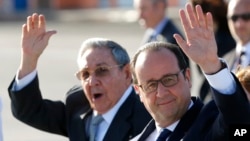Cuban President Raul Castro said Tuesday that dissidents are receiving "illegal" training at the U.S. diplomatic mission in Havana, an issue he raised with U.S. President Barack Obama in talks on restoring diplomatic ties.
Cuba and the United States are working to re-establish diplomatic relations that were severed in 1961, but a number of differences still need to be worked out, including a U.S. request for freedom of movement for its diplomats in Cuba.
The two countries have interests sections rather than embassies in each other's capitals. They would be upgraded to embassies once diplomatic ties are restored.
Castro, 83, did not say whether Cuba's complaint would impede the move toward diplomatic relations. He suggested ambassadors could be named after Cuba comes off the U.S. list of state sponsors of terrorism on May 29, but that the procedures were being debated.
"What I told them, concretely to the president, what most concerns me is that they continue doing illegal things ... for example, graduating independent journalists," Castro told reporters at Havana's international airport after seeing off visiting French President Francois Hollande.
"They give them I don't know how many classes, on screen, in teleconferences from the United States. I don't know if they give them a diploma, and of course they give them their corresponding monthly payment," Castro said.
The U.S. interests section offers free classes in journalism, English and information technology, but students are not paid. Cuba sees them as an attempt to meddle in Cuba's internal affairs and a violation of international conventions on diplomacy.
Cuba tightly controls its state-owned media and blocks websites run by independent journalists, who are typically critics of the one-party political system and denied journalism credentials.
Castro spoke with Obama last month at a regional summit in Panama, the first meeting of the leaders of both countries in nearly 60 years.
Once diplomatic relations are restored, the longtime adversaries will work on the more complicated task of normalizing overall relations. The U.S. trade embargo of Cuba, which only Congress can remove, remains a snag.
"They have to completely eliminate the blockade, and the base at Guantanamo must be returned," Castro said.
In 1903, the United States acquired rights to 45 square miles (116 square kilometers) of Cuban territory for a naval base at Guantanamo Bay, now the site of the military prison where the United States holds terrorism suspects.





